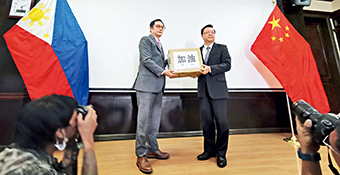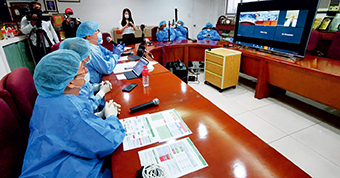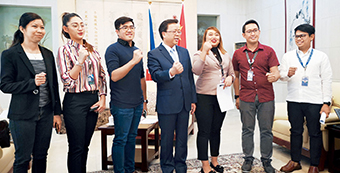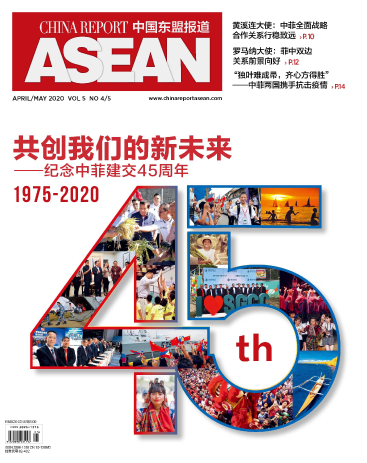
Medical experts sent by the Chinese government arrive at Manila’s Aquino International Airport on April 5 to help the Philippines fight the coronavirus.
After a charter flight touched down at Manila International Airport in the Philippines at 1:30 p.m. on April 5, Chinese medical experts on board were greeted by Chinese Ambassador to the Philippines Huang Xilian together with Philippines’ Foreign Affairs Secretary Teodoro Locsin, Presidential Communications Operations Secretary Martin Andanar and Energy Secretary Alfonso Cusi among other senior officials appearing on the tarmac. The experts brought a cargo of medical supplies direly needed in the Philippines. On the package were the words “A broom is sturdiest when its bristles are tightly bound” in both Chinese and Tagalog.
Since the novel coronavirus reached the Philippines, China has sent shipments of medical supplies to the country through its embassy in Manila. The efforts have been lauded by local people. Medical experts shared experience China gained in curbing the epidemic, implementing public health policy and treating infected patients.
“The Chinese people are sympathetic with the Philippine people during this difficult time of the coronavirus outbreak,” declared Huang Xilian, Chinese Ambassador to the Philippines, during handover of the assistance. “We hope these medical supplies will help the Philippine people fight the epidemic.” Huang noted that the Chinese people would never forget the helping hands offered by the Philippine government and people when China entered the most critical stage of the fight against the virus.
Standing Together
In the most responsible manner, the Chinese government took the most draconian, comprehensive and thorough measures to stem the spread of the coronavirus. China made tremendous sacrifices to protect the health and safety of the Chinese people and people around the world. Viruses respect no borders. China spared no efforts to combat the virus, and the Philippines stood firm with China.
On February 3, Philippine President Rodrigo Duterte praised China’s efforts to fight the novel coronavirus and said his country was ready to provide any assistance it could. He urged Philippine citizens to avoid anti-Chinese xenophobia motivated by the coronavirus outbreak. “China has been kind to us,” Duterte stressed. “We can only show the same favor to them.” Following the remarks, he wrote Chinese President Xi Jinping a letter to convey his condolences on the coronavirus epidemic.
On January 29, Philippine Foreign Affairs Secretary Teodoro Locsin praised China’s decisive measures to protect foreign nationals in China on social media and suggested that evacuations would only help the virus spread. On February 3, he responded to the news that China was building a hospital in only eight days to fight the virus. No country could act as fast as China did in the face of disaster, he said, adding that the resolve and capabilities China exhibited testified to its ability to overcome any difficulty. The sacrifices were huge, but humans will eventually triumph over the epidemic.
On February 20, China and ASEAN held a Special Foreign Ministers’ Meeting on the Coronavirus Disease in Vientiane, Laos. The meeting was co-chaired by Locsin and Chinese State Councilor and Foreign Minister Wang Yi. The Philippines currently serves as a coordinating country for China-ASEAN relations. The next day, Locsin commented on media coverage of the meeting on social media, accusing some governments and individuals of leveraging a threat to all humanity as a tool to push a geopolitical agenda by spreading rumors, he wrote. “It is shameful.” Chinese scientists finished genetic sequencing of the virus quickly and shared the data with international research institutes to help countries around the world make speedy diagnoses and develop vaccines and treatment therapies. From this perspective, the whole world owes much to China, Locsin said.
Many senior Philippine officials have been generous with praise for China’s anti-virus efforts. Among them are Cabinet Secretary Karlo Nograles, Finance Secretary Carlos Dominguez, Transportation Secretary Arthur Tugade and two undersecretaries for foreign affairs. They have urged the general public to stay rational and maintain solidarity in the face of the crisis. The Philippines would stand side by side with China to weather the epidemic, they said.
While voicing support for China, the Philippine government also offered anti-virus supplies to help the fight. On February 8, medical masks, protective gowns, goggles and gloves among other supplies donated to China by the Philippines departed Clark International Airport.
“I was deeply touched to see handwritten messages like ‘Stay strong, China’ on the packages and hear chants of ‘Stay strong, Wuhan’ at the airport,” recounted Ambassador Huang. “The donation was an exemplification of the Philippine people and government’s caring hearts.” The Philippines donated the supplies despite facing its own shortage of masks and other protective supplies due to the eruption of the Taal Volcano. Philippine society made unprecedentedly generous donations to China even as it was navigating its own troubles.
Helping Hands
Under the leadership of President Xi Jinping, China waged an all-out war against the coronavirus epidemic. Life and work are gradually recovering and both epidemic control and economic development have improved. However, the virus has been spreading in the Philippines since early March. New infections soared, medical facilities were overwhelmed, and the situation became grave. On March 25, President Duterte declared a state of national emergency for three months. The entire country was placed under enhanced community quarantine and curfews to curb the spread of the virus.
On March 11, Chinese Ambassador to the Philippines Huang Xilian visited President Duterte in Malacanang. He brought regards from Chinese President Xi Jinping to the Philippine people as well as the message that China was ready to help the Philippines fight the coronavirus.
On March 15, Wang Yi talked with Locsin on the phone at an invitation from the top Philippine diplomat. Wang said that China understood the difficulties the Philippines was facing and that China would spare no efforts to help the country by providing testing kits, protective gowns and other medical supplies as well as sending medical teams. The following day, 2,000 test kits donated by the Chinese embassy and charitable groups arrived in Manila and were delivered to the country’s Department of Health (DOH).
According to the DOH, the Philippines previously had only about 2,000 COVID-19 test kits for a country with a population of more than 100 million. China’s donations helped alleviate its dire shortage. Thanks to China’s help, its testing capacity and efficiency improved dramatically, said Health Assistant Secretary Maria Rosario Vergeire.
The Chinese Embassy in the Philippines played a key role in delivering the medical supplies from China. Early on March 21, a charter flight packed with the donations from China landed at Manila’s Aquino International Airport. The shipment included 100,000 COVID-19 test kits, 10,000 N95 face masks, 100,000 surgical masks and 10,000 protective suites among other supplies.
For days, anti-virus supplies were shipped from China to the Philippines and distributed to local health authorities by the Chinese embassy. The private sector was also mobilized to aid the fight. On March 27, the first shipment of donations from China’s Jack Ma Foundation and Alibaba Foundation arrived in Manila with the help of boxer-turned-politician Manny Pacquaio’s foundation. The next morning, a freight flight carrying 500,000 medical face masks donated by the Bank of China touched down at Aquino International Airport.
About 2 million Chinese live in the Philippines. Various Filipino-Chinese social groups have made their own donations to support the efforts against the virus both by China and the Philippines. The Chinese Embassy in the Philippines has been working with local Chinese media to keep the Chinese community informed of the latest information on the epidemic and measures the Philippine government has taken to curb it. The embassy shared knowledge of COVID-19 prevention and treatment therapies combining traditional Chinese medicine with Western medicine. Thanks to its coordination, online medical advice from Chinese medical facilities is now available to Chinese people living in the Philippines.
Sharing Experience
People who have dealt with this singular and novel virus are best positioned to provide suggestions for others, Locsin noted, stressing that the Chinese medical team had extensive experience fighting the virus that would help the Philippines tame the epidemic. Their arrival also made the Philippine government and people more confident about maintaining the fight until a total victory is achieved, he said.
“We will not directly participate in patient diagnosis or treatment, but instead focus on providing assistance and sharing experience we gained in our own fight,” explained Weng Shangeng, head of the Chinese medical team.
At San Lazaro Hospital in Manila, Chinese experts observed procedures of patient admission, visited ordinary wards and inspected the COVID-19 testing laboratory and intensive care unit as they were under construction. They also discussed China’s most recent therapeutic protocols for COVID-19 and answered questions from Philippine experts.
The Philippines’ Lung Center in Quezon City is one of three referral hospitals for COVID-19 patients in the country. Chinese experts also shared China’s therapeutic protocol for COVID-19 with medical professionals staffing the hospital. Weng Shangeng elaborated on China’s experience including screening all residents of Wuhan for infection and building temporary hospitals to treat patients with mild symptoms. Experts working in the hospital were impressed that China brought the epidemic under control in such a short period of time and expressed that the recommendations and experience brought by Chinese experts would boost their confidence in winning the fight.
The arrival of Chinese experts testified to the friendship between China and the Philippines, remarked Shi Bibo, executive vice president of the Philippine-Chinese Friendship Association. “Supporting each other in fighting this epidemic is how our two countries should act to build a community of a shared future for humanity,” Shi said.
Popular social media posts from the Philippines said things like “Thank you, China,” “Looking forward to Chinese experience” and “A friend in need is a friend indeed.” Many expressed appreciation for China and eagerness to strengthen exchange and cooperation with China on therapeutic protocol and drugs. The Chinese embassy has maintained frequent communication with the Philippine DOH to learn their demands and concerns. In addition to China’s therapeutic protocols for COVID-19 and other epidemic prevention and control manuals and guidelines, the Chinese embassy also helped facilitate a videoconference between a Chinese and a Philippine hospital to discuss COVID-19 prevention and treatment.
The embassy also published columns in local mainstream Chinese and English newspapers to share China’s anti-virus experience and popularize knowledge of public preventative measures.
In the fight against the epidemic, China-Philippines reciprocal help has demonstrated how true friends act in the face of crisis.
“I believe that concerted efforts from people of both countries will enable us to weather difficulties to defeat the invisible enemy,” declared Huang Xilian. “Friendship between the two countries will be even more solid and vibrant after this test.”

Philippine Foreign Affairs Undersecretary Brigido Dodo Dulay (left) hands anti-virus supplies to Chinese Ambassador Huang Xilian (right) on February 8. “Stay strong, Wuhan. Stay strong, China,” they chanted.

Eleven doctors from the Philippines’ Chinese General Hospital share virus experience with peers at the First Affiliated Hospital of the College of Medicine of Zhejiang University in Hangzhou via videoconferencing on March 24.

Chinese Ambassador to the Philippines Huang Xilian (center) after sharing China’s epidemic prevention and control as well as the situation of Filipino Chinese during a joint interview with three mainstream Filipino media outlets, PTV, PBS and PNA, on February 21.


 Copy Reference
Copy Reference